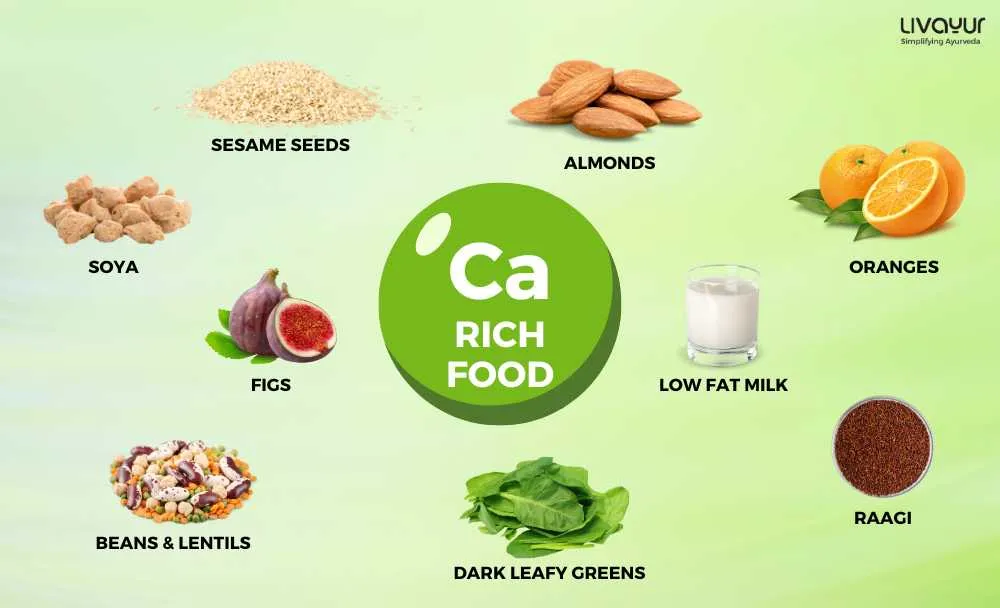
Calcium is an essential mineral that is required for many important bodily functions. It is needed for the formation and maintenance of strong bones and teeth, and it also plays a crucial role in muscle function, nerve signaling, and blood clotting. Calcium is particularly important during childhood and adolescence when bones are growing rapidly. If children do not get enough calcium during this period, they may not reach their full bone mass potential, which can lead to a higher risk of fractures and osteoporosis later in life. In addition, calcium intake is important throughout adulthood to help maintain bone strength and prevent osteoporosis, which is a condition that weakens bones and increases the risk of fractures. Calcium is essential for women, who are at a higher risk of osteoporosis after menopause.
Daily Calcium Requirements [1]
Calcium intake requirements for all individuals vary from person to person, depending on things like age, gender, etc. Here are the recommended dietary allowances for calcium:
| Age | Male | Female | Pregnant | Lactating |
| 0-6 months | 200 mg | 200 mg | ||
| 7-12 months | 260 mg | 260 mg | ||
| 1-3 years | 700 mg | 700 mg | ||
| 4-8 years | 1000 mg | 1000 mg | ||
| 9-13 years | 1300 mg | 1300 mg | ||
| 14-18 years | 1300 mg | 1300 mg | 1300 mg | 1300 mg |
| 19-50 years | 1000 mg | 1000 mg | 1000 mg | 1000 mg |
| 51-70 years | 1000 mg | 1200 mg | ||
| > 70+ years | 1200 mg | 1200 mg |
10 Best Calcium-Rich Foods for Stronger Bones
Here are some of the best calcium-rich foods you can include in your diet: [1]
1. Low-fat Milk
One cup of low-fat milk contains around 300 mg of calcium. Low-fat milk and yogurt are some of the healthiest sources of calcium.
2. Low-fat Yogurt
One cup of low-fat yogurt contains around 415 mg of calcium.
3. Sesame Seeds
Sesame seeds are a great source of calcium, with 975 mg (98% DV) of calcium per 100 grams. They are also rich in other nutrients like copper, manganese and magnesium, which is why they are highly recommended in Ayurvedic literature.
4. Other Seeds
Chia seeds, mustard seeds and flax seeds are also rich in calcium and offer a range of health benefits.
5. Tofu
Fortified soy products like tofu are a great source of calcium. They contain 350 mg (35% DV) of calcium per 100 grams.
6. Soybeans
Half a cup of cooked soybeans has 131 mg calcium, which is 10% of the daily value.
7. Soy Milk
1 cup of calcium-rich soy milk has 299 mg of calcium per 100 grams.
8. Almonds
Almonds are a great source of calcium, with 264 mg (26% DV) of calcium per 100 grams. They are also rich in other nutrients like vitamin E, magnesium, and fiber that can help with weight loss, skin health, and lots more.
9. Peanuts
100 g of peanuts have 49 mg calcium content. However, peanuts have very high calories and thus, might not be the most preferable source of calcium.
10. Dark Leafy Greens:
Dark leafy greens like spinach, methi, amaranthus and kale are some of the healthiest calcium-rich foods for vegetarians. Broccoli is also a decent source of calcium.
Spinach is particularly noteworthy, with a single 100 gm serving of the leafy green providing 99 mg of calcium (10%DV). Leafy greens are also rich in other nutrients like vitamin K, vitamin A, and iron. A single serving of turnip greens, which means ½ cup of fresh and boiled turnip greens contains 99 mg calcium (8% DV). 1 cup of fresh and cooked kale contains 94 mg of calcium (7% DV). ½ cup of raw broccoli has 21 mg of calcium per serving.
11. Fortified Plant-based Milk:
Plant-based milk are not only a great alternative to dairy for vegans or anyone with lactose intolerance, but some plant-based milk such as almond, soy, pea, and flaxseed milk contain more calcium than dairy milk.
12. Oranges:
Calcium-rich food for bones can also include fruits, with oranges being an excellent source of calcium. A 100 gm serving of orange will give 43 mg (4% DV) of calcium. Oranges are also rich in other nutrients, like vitamin C and fiber. In addition to oranges, pears, kiwis, and berries are good sources of calcium.
13. Raagi:
Raagi or nachni can be used to make traditional breads or porridge and it’s the most inexpensive source of some complex nutrition, including calcium. This is also one of the best calcium-rich foods for vegetarians, as it contains protein, while its polyphenols and dietary fiber offer numerous health benefits.
14. Beans and Lentils:
This can include chickpeas, white beans, kidney beans, and lentils they are all good sources of calcium and also tend to be nutritionally complex and contain minerals such as zinc, potassium, iron, magnesium, and folate.
15. Figs:
Figs are a great source of calcium, with 35 mg (3% DV) of calcium per 100 grams. They are also rich in other nutrients like fiber and potassium, making them heart-healthy.
It’s important to note that the amount of calcium can vary depending on the source, so it’s a good idea to talk to a healthcare professional about individual needs to ensure one is getting enough calcium in the diet.
16. Fish and Seafood
People who, due to allergies or other reasons, cannot consume dairy products, can acquire their calcium from non-dairy sources such as seafood and canned fish with bones. [1]
Lifestyle factors for better calcium absorption [1]
- The body has between 26 and 30 g of calcium at birth. After birth, this amount rapidly increases, reaching 1,200 g for women and 1,400 g for males by adulthood.
- Men’s levels stay the same, but in women, they begin to decline as a result of increased bone remodeling brought on by a reduction in estrogen production at the onset of menopause.
- The connection between calcium absorption and ingestion is inverse. At 200 mg/day, around 45% of the calcium is absorbed through food; at larger dosages (above 2,000 mg/day), only 15% of the calcium is absorbed.
- Dietary calcium absorption is also impacted by age.
- In newborns and growing children, net absorption of dietary calcium can reach 60%, since they require significant amounts to develop strong bones. However, as adults age, this absorption gradually diminishes to approximately 25%.
FAQs
1. Which seeds are calcium-rich?
Sesame seeds, chia seeds, flaxseeds and mustard seeds are rich in calcium.
2. How much calcium is there in our bodies, at birth?
The body has between 26 and 30 g of calcium at birth.
3. Why does calcium absorption decline in females?
In women, calcium absorption begins to decline due to increased bone remodeling brought on by a reduction in estrogen production at the onset of menopause.
Conclusions
To conclude, sufficient calcium consumption is essential for good health in general, and for the growth and upkeep of healthy bones and teeth in particular. This mineral is essential for several body processes, including nerve and muscle transmission. It’s critical to meet the daily requirements for calcium, as shown for various age groups. A wide range of calcium-rich foods, including almonds, dark leafy greens, soy products, low-fat dairy, seeds, fortified plant-based milk, oranges, and other fruits and traditional foods like Raagi, legumes, figs, and seafood, can make a substantial difference in your diet. A diet high in calcium also has a greater impact on bone health when lifestyle factors that influence calcium absorption are understood.


















